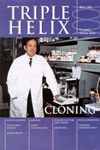In October 2001 the High Court heard Mrs Pretty's appeal against an earlier decision of the Director of Public Prosecutions (DPP) not to rule out action being taken against her husband in the event of his securing her death. The Court rejected her case on the grounds that the DPP had no power to grant a pardon in advance. This ruling was upheld by the House of Lords on 29 November and she is now planning to appeal to the European Court of Human Rights.[1] As with the 1997 case of Annie Lindsell, who also had MND and asked the courts to allow her to have the distress of her illness relieved by medical treatment that might also shorten her life, Mrs Pretty was supported by the Voluntary Euthanasia Society as part of their persistent campaign to legalise euthanasia in this country.
Diane Pretty based her case principally on two types of assertion. The first was that if she continued in the course of her MND she would suffer from severe pain and disability and distressing symptoms, would undergo inhuman and degrading treatment, and would be compelled to endure her condition unrelieved. The second was that the blanket prohibition in English law on assisting someone to commit suicide was against the European Convention on Human Rights.
Article 2 of the Human Rights Convention, which last year formally became a part of English law, protects the individual's right to life. However, such protection is not unconditional and in a Swiss case the European Court has held that the Convention does not require the State to prohibit suicide. Article 3 of the Convention says that no one shall be subjected to inhuman or degrading treatment: Diane Pretty's lawyers argued that her continuation of life amounted to exactly such a mode of treatment and that her absolute right not to be so subjected, together with her right to personal autonomy, outweighed any duty of the State to protect her life.
MND is a most unpleasant condition that results in a progressive loss of many body functions. It is incurable and leads to death in an average of about three years. The mode of death is the loss of respiratory muscle function leading to respiratory failure. Aside from this, the pattern of muscle weakness is highly variable but eventually a greater or lesser spread of paralysis always occurs. In so-called bulbar motor neurone disease, when the muscles of swallowing are impaired, there is difficulty in swallowing not only food and drink but also saliva. Diane Pretty appears to have this form of MND, and her needs for nutrition and the relief of hunger have been met by the insertion of a gastrostomy feeding tube.
The treatments for the control of the symptoms of MND have much in common with those used for symptom management in other neurological diseases and in cancer. If such treatment is to be classified as 'inhuman and degrading' this does not apply uniquely to people with MND but also to the many thousands receiving palliation for other progressive diseases.
As Christians we may feel both that despair is in effect a rejection of God's eternal promise of his loving presence (Mt 28:20), and a sin against the Holy Spirit (Mk 3:29), while suicide itself is contrary to the sixth commandment (Ex 20:13). However, in our society acceptance of euthanasia cannot be prevented by arguments from faith.
Whom is euthanasia meant to benefit? Even among the terminally ill, assisted dying is a minority interest: just 6% of hospice patients even discuss the matter, and only 3.6% of terminally ill patients in other care settings.[2] These figures are very different from the 80% or more of healthy adults who say in opinion polls that they support legalisation of euthanasia. When illness happens, something changes for most people.
Security and skilled maintenance of comfort are important and in Holland where euthanasia is now legal, two-thirds of requests for assisted suicide or euthanasia are rescinded as a result of palliative interventions. Nearly half of candidates for physician-assisted suicide in Oregon, where such acts are permitted, withdrew their request if offered even one palliative care intervention.[3] Not caring is always cheaper than caring, and in a cash-limited system it is unlikely that resources for such palliative care would improve if euthanasia offered a cheaper alternative.
Death by euthanasia is not necessarily easier than a natural death. Difficulties have been reported in nearly 15% of Dutch euthanasia cases, some of which have had distressing effects such as vomiting, muscle spasm, extreme gasping or the re-awakening of the patient.[4] If such events occur when death is being brought about by qualified physicians they would be even more likely to result from the efforts of a lay person as envisaged by Mr and Mrs Pretty.
Then there is the question of why people would want euthanasia. Of those who died after assisted suicide in Oregon in the years 1998, 1999 and 2000 the proportion who felt themselves to be burdensome was 12%, 26% and 63% respectively, ie. the longer the Oregon right-to-die legislation has been in force the greater the proportion of those dying under its provisions who have felt that others would be better off if they were not there.[3] To allow this to go on would not build a caring and cohesive society.
To make provision for Diane Pretty to be killed would not only affect her as an isolated individual. Instead, it would be likely to have repercussions for a multitude of other very ill people through reducing their opportunities to achieve comfort and reducing, rather than enhancing, their autonomy.
This article was originally commissioned by the Nucleus Editorial Team and is reprinted here with kind permission.
































